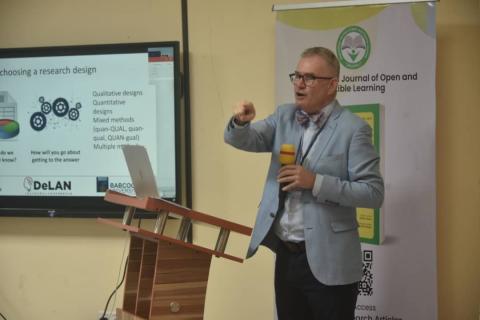
Prof. Paul Prinsloo
Inadequate critical mass of Open and Distance e-Learning (ODeL) experts and mechanism for dissemination of findings have been identified as some of the challenges bedeviling Open, Distance and e-Learning (ODeL) in Nigeria, a research professor in ODL, College of Economic and Management Sciences, University of South Africa (UNISA), Prof. Paul Prinsloo, has said.
He also mentioned approaches to ODeL research, poor incentive systems, capacity building in ODeL theory and practice, workload issues, among others, as part of the recurring challenges.
Prinsloo stated this during the Pre-Conference Workshop of Inaugural Conference of Open, Distance and e-Learning Association of Nigeria (ODeLAN) in collaboration with the National Open University of Nigeria (NOUN), which took place in Ogun State.
With the theme: “Global Spaces, Local Contexts: Digital Transformations and Innovations in Open, Distance and e-Learning (ODeL), the 2-day conference was held on May 1 and 2, 2023 at Babcock University, Ilishan-Remo, Ogun State.
“The main ones relate to lack of serious advocacy, unacceptable public perception of distance learning as a poor cousin of face-to-face formal learning system, excessively and unnecessarily expensive broadband internet connection, unstable communication networks, unreliable power situation, lack of appreciation even by academics and other academic institutions of the rigour that establishing and managing distance learning requires and ineffectual personal discipline by students in coping with the demands of studying on their own,” he cited in his presentation.
Cross section of participants at the Pre-workshop conference
Presenting a paper tilted: “The Need for Quality ODL Research,” the UNISA erudite scholar and the lead facilitator said there was the need to properly tackle the challenges and successful implementation of ODEL in Nigeria.
Prinsloo highlighted that ODL research lacks rigor,as African university libraries cannot afford the license fees of Scopus, Web Science, among others culminated in the challenges and limitations in doing ODeL research.
Speaking further, he mentioned the experimental research studies that lack rigour in design; reflect little or no theoretical foundations; focus on descriptive surveys; inappropriate generalisations as some of the ODeL research criques.
Despite the challenges and critics of ODeL, the positive signs of change, he said, are that more ODL practitioners are emerging, reputable quality ODeL journals, training programmes in ODL are available and calls for an ODeL research agenda.
Earlier in her welcome remarks, the Director, Regional Training and Research Institute of the National Open University of Nigeria (NOUN-RETRIDOL), Prof. Christine Ofulue said, the objectives of the pre- workshop conference were to acquaint participants with an introduction to the purpose of ODeL research; identify factors that determine the choice of research questions, consider affordances and pitfalls of method selection, examine strategies for navigating research in ODeL and discussing strategies for getting published in high impact journals.
“It is expected that participants will come up with ideas for research join special interest groups that will be set up to take research in ODeL forward,” she added.
Director, Regional Training and Research Institute of the National Open University of Nigeria (NOUN-RETRIDOL), Prof. Christine Ofulue
Ofulue also stated that the workshop was in line with RETRIDOL’s primary mandate to build the capacity of higher education institutions for the Open and Distance Learning; foster regional networking, partnerships and collaboration for the promotion of ODL in the West-African sub-region and beyond.
“The focus of this workshop, on research in ODeL, is timely and apt especially in the context of the ODeLAN’s conference which aims to consider various research issues in the Nigerian context,” she said.
The director also stated that ODeL is unique in the sense that practitioners come from all fields/disciplines, “ODeL should not be viewed as a discipline in its right but also it is approached applying appropriate theories, design and methods.”
According to her, issues are changing as in the context of the 4th Industial Revolution (4IR), emerging technologies and their adoption for teaching and learning, and not the least, the impact of Covid-19 on Higher Education Learnings (HEIs ) who are presently grappling on their operations and are therefore increasing their use of technology to mitigate the impact.
“Although distance learning has been in existence for some decades now, the pandemic has contributed to its mainstreaming through different modes, including online and blended learning.
“One of the implications of these changes on our practice is the need to integrate technology into teaching and learning to enhance the quality of content and delivery, as well as, students’ learning experience,” she said.
Ofulue told participants that she was “particularly pleased to note the overwhelming response of participants to this workshop and conference which for me is very positive and an indication of your passion and commitment to promoting the cause of ODeL in Nigeria.”
It would be recalled that ODeLAN was conceptualised and birthed to provide a platform for research, training, policy, practice and networking towards the orderly development of the ODL and e-learning sectors of the Nigerian education system.

